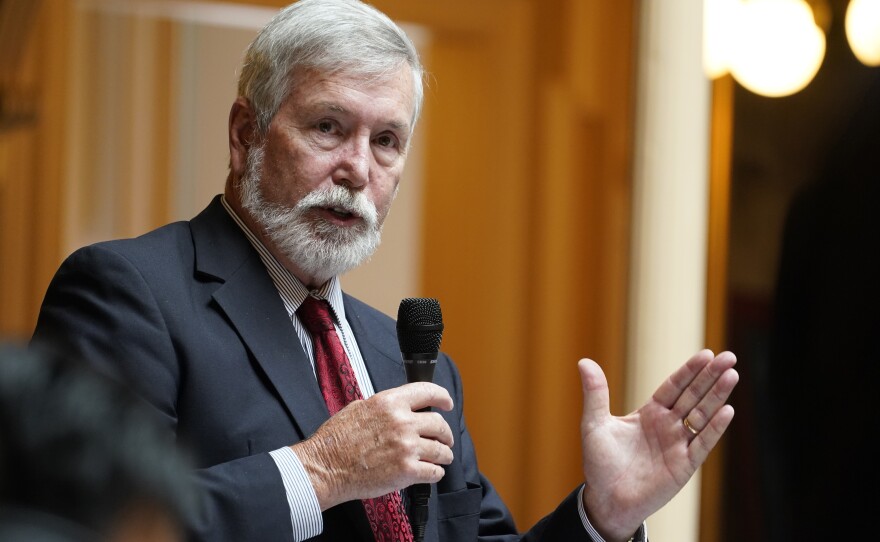Members of the General Assembly received the official budget package Tuesday, widening consideration of amendments prepared by House and Senate committees that differ greatly on tax cuts and spending.
On Sunday, House and Senate appropriations committees approved their amendments to Gov. Glenn Youngkin’s budget proposal, which centered around tax cuts, public safety spending and education funding.
While the House did make changes to Youngkin’s budget, it stayed closer to it than the Senate and maintained the governor’s $1 billion in tax cuts. Last year, the assembly approved $4 billion in tax cuts.
But the influential Senate committee that leads the crafting of the budget rejected the tax cuts.
“It’s hard to say that you’re going to cut taxes when we haven’t been paying our bills for years, which has gotten us into the issues we are trying to fund now,” said Sen. Mamie Locke (D-Hampton), who sits on the Senate Finance and Appropriations Committee.
Virginia put off spending at the beginning of the COVID-19 pandemic to hedge against the recession that followed.
Then, massive amounts of federal aid, a quicker-than-anticipated economic recovery and even inflation contributed to the state taking in billions more than it expected to.
Still, economic uncertainty and how to address it is influencing the budget process this year.
While there are some signs of inflation easing, administration finance officials and budget planners have been preparing for a recession.
“We've been kicking this can down the road of a recession,” said Del. Barry Knight (R–Virginia Beach), who is the chairperson of the House Appropriations Committee.
“We kept thinking it was going to happen a year ago, six months ago. We still think it's going to happen,” Knight said. “We're still preparing for it, but the further we kick it down the road, maybe the better off we'll be.”
Knight said that this budget would put money into one-time expenses. That avoids committing money year after year, in case tax revenues go down during an economic downturn.
Youngkin’s budget required that certain revenue estimates be met before spending about $1.1 billion dollars on a combination of tax cuts, performance bonuses for state employees and economic development investments.
House and Senate budgets compared
The House already approved large tax cuts, but they still need to pass through the Senate. One bill to lower taxes for businesses would reduce revenues by $462 million next year. Another would reduce the state’s top income tax bracket, which would bring in $428 million less. The proposals would also decrease revenues for each year going forward.
The Senate Finance Committee’s counterpoint to the tax cuts was higher K-12 education funding, recommending $588.7 million in additional direct aid on top of the $443.9 million in Youngkin’s introduced budget. The Senate recommendations also include removing additional money for lab schools, a type of charter school that was funded in last year’s budget.
“When combined with the adopted increases in the current budget, we will invest $3.9 billion in public education,” Sen. Dick Saslaw (D–Fairfax) told the committee.
Senate and House budgets calculated differently how much funding could prevent negative effects of an error that led to the Virginia Department of Education overcommunicating the amount of state funding school divisions would receive. The House provided $4.9 million, the Senate $58 million.
The Senate also watered down Youngkin’s largest policy spending amendment, $450 million for developing business-ready sites. Budget language would allow the governor and administration officials to split the funds between the Virginia Business Ready Sites Program and Site Acquisition Pilot Program.
The pilot program would have the state purchase up to three sites to prepare for business development. The Senate instead redirected funds, and not at the same level, only to the Virginia Business Ready Sites Program.
“We're a little concerned about the whole purchasing of land,” said Sen. Dave Marsden (D–Fairfax). “We feel that the amount of money that we put into this is enough to get us going enhance what we did last year.”
Youngkin issued a statement on Sunday reiterating his budget priorities.
"I said we needed to lower taxes to make Virginia more competitive for families and businesses, invest more in education to help children recover from learning loss, invest more to recruit 2,000 new law enforcement heroes, and take a major first step in transforming our behavioral health system. Those are still our goals, and I look forward to reviewing today's proposals from the House and Senate,” Youngkin wrote.
There were also notable points of agreement in the two budgets.
Both the Senate and House of Delegates budgets give public sector employees a 2% raise, including higher education employees and K-12 teachers. The raise would come on top of a 5% raise in each 2023 and 2024 written into the budget process last year.
Virginia’s teachers had faced the largest pay discrepancy in the US by some measures. Youngkin’s budget had provided a bonus to teachers but no raises.
K-12 Support staff would get a $1,000 bonus in the proposed budgets as well.
Next steps
Legislators have 48 hours to review the budgets before they are considered by the House of Delegates and state Senate on Thursday.
It is expected that neither chamber will agree to the other’s amendments, putting the budget process to a conference committee made up of representatives from each party in each house, which will have to resolve differences behind closed doors.
The hope is that the budget will pass by the last day of session, Saturday Feb. 25. If no amended budget is passed, the state will continue to operate under the biennial budget passed last year.
This story is powered by the 2023 People's Agenda.



